
NEOPLASMA
Scope & Guideline
Connecting Researchers for a Cancer-Free Future
Introduction
Aims and Scopes
- Molecular Mechanisms of Cancer:
Research focusing on the underlying biological processes and molecular pathways that contribute to cancer development and progression, including studies on gene expressions, signaling pathways, and cellular interactions. - Therapeutic Strategies and Clinical Trials:
Papers that explore novel treatments, drug combinations, and clinical trial results aimed at improving patient outcomes in various cancer types. - Cancer Biomarkers and Diagnostics:
Studies aimed at identifying and validating biomarkers for cancer diagnosis, prognosis, and treatment response, facilitating personalized medicine approaches. - Tumor Microenvironment and Metastasis:
Research that investigates the interactions between tumor cells and their microenvironment, including the role of stromal cells, immune responses, and metastatic behavior. - Preclinical and Translational Research:
Emphasis on the development of innovative models and methodologies to study cancer, including in vitro and in vivo studies that bridge laboratory findings to clinical applications.
Trending and Emerging
- Targeted and Personalized Therapies:
An increasing number of studies are focusing on targeted therapies, particularly those tailored to specific genetic mutations and biomarkers, indicating a shift towards precision medicine in oncology. - Immunotherapy and Immune Checkpoint Inhibitors:
Research examining the mechanisms and efficacy of immunotherapies, particularly immune checkpoint inhibitors, is on the rise as these treatments become central to cancer management. - Ferroptosis and Novel Cell Death Mechanisms:
Emerging interest in ferroptosis and other forms of regulated cell death as potential therapeutic targets reflects a deeper understanding of cancer biology and treatment resistance. - MicroRNA and Long Non-Coding RNA Research:
Studies exploring the roles of microRNAs and long non-coding RNAs in cancer progression and therapy resistance are increasingly prevalent, highlighting the importance of non-coding RNA in tumor biology. - Cancer Metabolism and Metabolic Reprogramming:
Research focusing on the metabolic adaptations of cancer cells and how these can be targeted for therapeutic benefit is gaining traction, reflecting a broader interest in cancer cell biology.
Declining or Waning
- Traditional Chemotherapy Studies:
Research focused solely on traditional chemotherapy regimens is less frequent, as there is a growing emphasis on targeted therapies and immunotherapy approaches. - Basic Histopathological Studies:
Papers that primarily describe histopathological features without integrating molecular or genetic analyses are becoming less prominent, reflecting a shift towards more comprehensive approaches that combine multiple disciplines. - Single-Agent Drug Studies:
There is a noticeable decline in studies investigating the efficacy of single-agent therapies, as combination therapies and multi-modal treatment strategies are gaining more attention. - Non-Clinical Research:
Research that lacks translational relevance or direct clinical implications is decreasing, as the focus shifts towards studies that can directly inform clinical practice and patient care.
Similar Journals
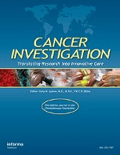
CANCER INVESTIGATION
Advancing cancer research, one investigation at a time.CANCER INVESTIGATION is a distinguished peer-reviewed journal published by Taylor & Francis Inc, dedicated to the advancing field of cancer research and oncology. With an ISSN of 0735-7907 and E-ISSN of 1532-4192, this journal has been a pivotal resource for professionals and researchers since its inception in 1983, continually contributing to the evolving landscape of cancer investigation until its convergence in 2024. CANCER INVESTIGATION boasts noteworthy rankings in 2023, including Q3 in Cancer Research and Q2 in Medicine (miscellaneous), highlighting its relevance and impact in these critical areas. The journal's commitment to disseminating innovative research and comprehensive reviews makes it an essential platform for those engaged in cancer studies and related disciplines. While currently not available as an open-access publication, CANCER INVESTIGATION remains an invaluable tool for understanding the complexities of cancer, offering insights that drive scientific advancements and improve patient outcomes.
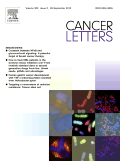
CANCER LETTERS
Unveiling the latest breakthroughs in oncology.Cancer Letters, a leading journal published by Elsevier Ireland Ltd, is dedicated to advancing the field of oncology and cancer research. With a rich history that spans from 1975 to 2024, this esteemed journal has established itself as a vital resource within the scientific community, holding a prestigious Q1 status in both Cancer Research and Oncology categories as of 2023. With an impressive ranking of #26/404 in Medicine _ Oncology and #19/230 in Biochemistry, Genetics and Molecular Biology _ Cancer Research, Cancer Letters sits in the top percentiles of its field, reflecting its high impact and relevance. Although it does not currently offer open access, the journal remains committed to disseminating paramount research findings, innovative methodologies, and critical reviews that inform and enhance ongoing studies in cancer therapeutics and patient care. Researchers, professionals, and students alike will find invaluable insights into the latest developments and discoveries in cancer research through the pages of Cancer Letters.
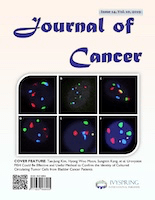
Journal of Cancer
Elevating cancer research to new heights.Journal of Cancer is a premier, peer-reviewed academic journal published by IVYSPRING INTERNATIONAL PUBLISHING that focuses on advancing the field of oncology. With an impact factor reflecting its significant contributions, this journal ranks in the 80th percentile of medical journals pertaining to oncology, positioning it at #79 out of 404 in Scopus. Since its inception in 2010, the journal has embraced an Open Access model, ensuring that groundbreaking research reaches a global audience without barriers. Based in Australia, the journal addresses a wide array of topics within cancer research, catering to researchers, healthcare professionals, and students committed to enhancing their understanding of the complexities of cancer. Amidst evolving challenges in oncology, the Journal of Cancer serves as a vital platform for disseminating innovative findings, fostering collaboration, and promoting informed decisions that can lead to improved cancer outcomes worldwide.
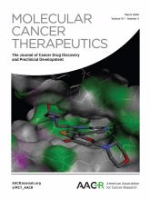
MOLECULAR CANCER THERAPEUTICS
Empowering breakthroughs in cancer research and treatment.MOLECULAR CANCER THERAPEUTICS, published by the American Association for Cancer Research, is a premier journal dedicated to advancing the field of cancer research and therapy since 2001. With a notable impact factor reflecting its high-quality content, this journal stands out in the Q1 category for both Cancer Research and Oncology as of 2023. Researchers, clinicians, and students interested in innovative treatment strategies and molecular mechanisms can find valuable insights within its pages, bolstered by a rigorous peer-review process and a global perspective on cancer therapeutic developments. Although the journal operates under a subscription model, it provides comprehensive access to cutting-edge studies and reviews that drive forward the understanding of cancer biology and treatment modalities. The journal's impressive Scopus rankings further validate its influence within both oncology and the broader cancer research community, making it an indispensable resource for anyone committed to combating cancer through science.

CELLULAR ONCOLOGY
Unleashing Innovative Insights in OncologyCELLULAR ONCOLOGY is an esteemed open access journal published by SPRINGER since 2004, specializing in the dynamic field of oncological research. With its ISSN 2211-3428 and E-ISSN 2211-3436, this journal plays a pivotal role in disseminating cutting-edge findings and innovative methodologies that address cancer at the cellular level. The journal has consistently achieved high-impact recognition, currently holding a Q2 rating in Cancer Research and Q1 rankings in Medicine (miscellaneous), Molecular Medicine, and Oncology as of 2023. Furthermore, it ranks 56th in oncology medicine and 48th in cancer research according to Scopus, placing it firmly within the top echelons of its field. Published in the Netherlands, with an aim to connect scientists, clinicians, and practitioners worldwide, CELLULAR ONCOLOGY fosters a collaborative environment for researchers to share insights, enhance understanding, and advance treatments. The journal’s open access model ensures that ground-breaking research is freely available, facilitating greater visibility and impact within the scientific community and beyond.

Molecular & Cellular Oncology
Innovating therapeutic interventions for a brighter future.Molecular & Cellular Oncology, published by Taylor & Francis Inc, is a vital academic journal dedicated to the exploration of cancer biology through the lens of molecular and cellular mechanisms. Since its inception in 2014, the journal has played a crucial role in disseminating innovative research findings that address the fundamental aspects of cancer research and molecular medicine. With its current ranking in Scopus placing it in the Q3 quartile for both Cancer Research and Molecular Medicine, the journal provides a platform for groundbreaking studies that push the boundaries of our understanding of oncogenesis and therapeutic interventions. Although the journal operates under a subscription model, its dedication to high-quality peer-reviewed research makes it an essential resource for researchers, professionals, and students aiming to contribute to or stay updated in the rapidly evolving field of oncology. As we approach the culmination of its converged years in 2024, Molecular & Cellular Oncology aims to continue fostering collaborations and insights that advance cancer research on a global scale.

Cancer Cell International
Transforming Knowledge into Cancer SolutionsCancer Cell International, published by BMC, is a transformative open-access journal established in 2001, dedicated to advancing the field of oncology and cancer research. With its ISSN number not specified and an E-ISSN of 1475-2867, the journal proudly operates from the United Kingdom, located at CAMPUS, 4 Crinan St, London N1 9XW, England. Renowned for its rigorous peer-review process, Cancer Cell International has made significant strides, securing a Q2 ranking in Cancer Research and Q1 rankings in both Genetics and Oncology as of 2023. It ranks impressively in Scopus, featuring in the top quintile of Genetics (#37/347) and Oncology (#52/404), indicating its importance within the scientific community. The journal's broad scope caters to a diverse array of topics within cancer biology, making it an invaluable resource for researchers, professionals, and students seeking to stay at the forefront of cancer science. With a commitment to disseminating high-quality research, Cancer Cell International invites scholars to explore innovative findings and contribute to the collective effort of combating cancer.
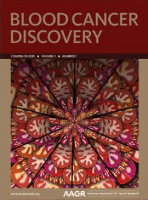
Blood Cancer Discovery
Empowering Scholars to Shape the Future of HematologyBlood Cancer Discovery is a premier academic journal published by the American Association for Cancer Research, dedicated to advancing the understanding of hematologic malignancies through cutting-edge research in the fields of oncology, biochemistry, and molecular biology. With an impressive impact factor and recognition as a Q1 journal across multiple disciplines, including cancer research and hematology, Blood Cancer Discovery serves as an essential platform for scholars and practitioners alike, facilitating impactful discourse and dissemination of pioneering findings. This open-access journal, established within the vibrant academic landscape of the United States, aims to bridge gaps in research and foster collaborations to ultimately enhance patient outcomes. Its Scopus rankings demonstrate its vital role in the critical advancement of cancer research and therapeutic development. By inviting contributions from a diverse range of disciplines, Blood Cancer Discovery is poised to drive innovation and inspire future advancements in understanding blood cancers.

BIOCHIMICA ET BIOPHYSICA ACTA-REVIEWS ON CANCER
Pioneering Insights in Oncology and GeneticsBIOCHIMICA ET BIOPHYSICA ACTA-REVIEWS ON CANCER, published by Elsevier, has established itself as a leading journal in the domains of cancer research, genetics, and oncology, holding a prestigious position in the Q1 quartile rankings in these fields as of 2023. With an ISSN of 0304-419X and an E-ISSN of 1879-2561, this journal aims to disseminate high-quality, impactful reviews that synthesize the latest advancements and findings in cancer biology, treatment modalities, and genomic studies. Its robust indexing and remarkable Scopus rankings—placing it in the 95th to 91st percentiles across various categories—underline its significance for researchers, clinicians, and students passionate about oncology. Operating from its Netherlands headquarters, BIOCHIMICA ET BIOPHYSICA ACTA-REVIEWS ON CANCER is dedicated to fostering a comprehensive understanding of the complex biological mechanisms underlying cancer, promoting innovative therapeutic strategies, and guiding future research directions.

Cancer Communications
Pioneering Discoveries in Cancer CommunicationsCancer Communications, published by WILEY, is a leading open-access journal that has positioned itself at the forefront of cancer research and oncology since its inception in 2017. With an impressive HIndex reflective of its scholarly impact and recognized in the Q1 category for both Cancer Research and Oncology as of 2023, this journal consistently ranks in the top echelons of its field, specifically at Rank #16/404 and Rank #13/230 in their respective categories on Scopus. Cancer Communications aims to disseminate cutting-edge research findings, innovative methodologies, and significant advancements in cancer treatments, thereby fostering a deeper understanding of oncology among researchers, healthcare professionals, and students. The journal operates under an Open Access model since 2018, ensuring that vital research is accessible to a global audience, thus enhancing collaboration and knowledge sharing necessary to tackle one of the most pressing health challenges of our time. Located in Hoboken, NJ, United States, and with a strong commitment to scientific excellence, Cancer Communications remains an essential resource for anyone engaged in the fight against cancer.